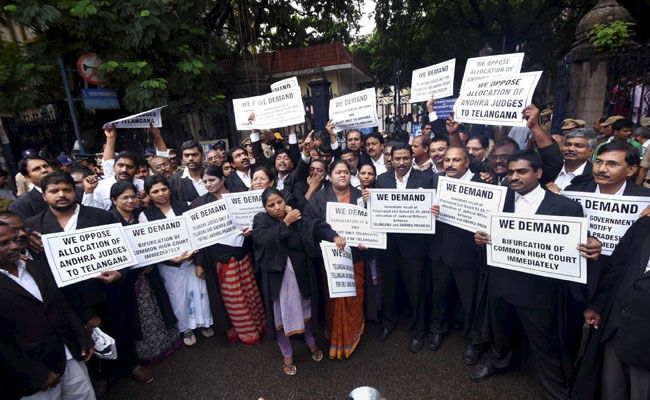This article is written by Sarthak Gupta, from Institute of Law, Nirma University, Ahmedabad. This article discusses the right of an advocate to go on a strike and arguments against it.
Table of Contents
Introduction
The right of an advocate to strike is a topic that has been hotly debated over decades and a positional essence of the arguments can be gained from a report titled “Role of the Legal Profession in Administration of Justice” by the Law Commission of India in 1988. In the report, it was stated While on the one hand advocates aggressively demand the right to strike on the other hand voluntary organization and judges among other people maintain that advocates have no right to go on strike.
Why do advocates go on strike?
There are many reasons for advocates going on strike, some of them have been mentioned here
- When there is some kind of conflict between advocates and investigating authority.
- Corruption or misbehavior of Judicial Officers.
- Non-filling of vacancies arising in Courts for a long period.
- Withdrawal of jurisdiction and conferring it to some other court.
- Constitution of Benches of High Courts.
- Any law passed by the parliament or State Legislative against the interest of the advocates.
- When there is some issue of national or regional importance which affects the public at large.

What are the arguments against the right to strike of advocate?
Advocates are officers of the court and they have a high standing in society but they also have some obligations and duties to ensure the smooth functioning of the courts. They owe a duty towards their client and court, they cannot use the strike to blackmail them. In Krishnakant Tamrakar vs State of Madhya Pradesh Supreme Court rightly pointed out that every strike, causes non reversible damage to the judicial system, particularly to the litigants.
At present, there are 3.3 crore cases pending in the various courts in this country and these strikes add fuel to the fire. The Law Commission in one of its reports statistically demonstrated how strikes add to the number of pending cases. Between 31st December 1987 and 30th June 1988, almost all advocates in the capital were on strike. The pending number of cases on 31st December 1987 (at the start of the strike) in the Supreme Court of India, was 1,75,748 and this number rose to 1,85,950 by the end of the strike on the 30th of June 1988. There was thus an increase of 10,202 in the pending number of cases in a period of six months. If this number was compared with the previous graph of increasing in a pending number of cases, it can be easily found that sudden rise is purely attributable to the strike of the advocates.
Strikes by advocates infringe fundamental right of the litigants of speedy trial. In the case of Hussainara Khatoon v. Home Secretary, State of Bihar, (1980) 1 SCC 81 the Supreme Court of India held that the right to a speedy trial is a fundamental right under Article 21. Moreover strike by advocate leads to wastage of valuable time of the court and hard earned money of tax-payers. These strikes also lower the image.
It should be noted that in most of the case where advocate goes on strike there are various existing legal remedy available to them and even if there is no legal remedy available, instead of paralyzing the court, advocates may use the other methods to strike like giving interviews press statements, wearing black or white or any color armbands, peaceful protest marches outside and away from Court premises, etc.
Courts in India against strike
B.L. Wadhera vs State (National Capital Territory of Delhi)
In this case, Delhi High court held that if an advocate holds vakalatnama for a case and he abstains from appearing before the court then he commits professional misconduct. Supreme Court, in this case, gave some principle that needs to be followed
- Bar on strike does not give an excuse to the advocate to not discharge his activities.
- If an advocate goes on strike, then they are supposed to return the client fees with sufficient notice so that an alternative arrangement could be made by the client.
- If there is a chance that the client will not be able to make alternative arrangements then the advocates should make sure to appear in court.
- If an advocate(s) decides to go to court despite the strike then by any means he cannot be intimidated to not go.
- If an advocate does not follow the strike then no disciplinary action can be taken against him.
- A judicial officer cannot be threatened while performing his duties.
- In a rare circumstance, the court may agree to give a collective adjournment if the reason for the strike is justified and the strike is of a shorter period.
- If an advocate wants to present his case even if the court has agreed for collective adjournment, then it is the duty of the court to hear the advocate.
- A court shall never review a case in which ex parte decision has been given by court due to strike by an advocate.
- If an advocate accepts a case and fails to appear before the court, he commits professional misconduct, a breach of contract, a breach of trust and a breach of professional duty.
Harish Uppal vs Union of India on 17 December, 2002
The petitioner, in this case, was an ex-army officer. In 1972 petitioner was posted in Bangladesh, where some embezzlement related accusation was put on him and he was brought to the army court in India, where charges against him were framed and he was court-martialed from his post and titles along with imprisoned for 2 years.
He filed a pre-confirmation application in a civil Court to review the matter and he received a reply from the court after a long period of 11 years, when the limitation period of the review has expired. It was later found that documents along the application got misplaced during a violent strike by advocates. A special petition was filed by the petitioner to declare strikes by advocates illegal.
After analyzing the whole matter, Supreme Court of India came up with the conclusion that
- Strike by the advocate is unlawful.
- A strike will only be permitted in rarest of the rare cases where integrity, respect, and working of the bar is at the stake.
- A Silent dissatisfaction can be shown or an interview to the press and media can be given, till the time it doesn’t hamper the working of the court.
Ramon Services Pvt. Ltd vs Subhash Kapoor And Others on 14 November, 2000
A suit was filed against the appellant company, a tenant in a building on Barakhamba Road, Delhi for the eviction of the company from the building. The issue was framed and the case was posted on trial on 26.8.1998. On the day of the trial, none of the advocates from the law firm which was appointed by the appellant were present in the court as advocates of that firm were engaged in the strike called by advocate association. The court listed the matter on some other date but on that day also no advocate was present and hence the court gave an ex parte decision against the appellant company.
Under order 7 rule 13 of the Code of Criminal Procedure appellant approached the trial court for dismissal of the ex parte decision of the court but the plea was dismissed by the trial court. The latter appellant approached the high court for the dismissal of the appeal but that was also dismissed. Finally, appellant approached the Supreme Court of India where the Supreme Court of India held that if a strike attorney is not present and the court gives ex parte decision then any loss occurred by the all such expenses would be paid by the attorney or the law firm which he represents.
Bar council of India
Section 35 of the Advocate Act gives the Bar Council of India the power to form a disciplinary committee against an advocate if it has reason to believe that the advocate was guilty of professional or other misconduct. In Common Cause a Registered Society v. Union of India and Supreme court of India very clearly stated that if any association of advocate call for a strike, the bar council of India must take stringent action against such association.
In the Ex-Capt. Harish Uppal v Union of India the Supreme court of India made it clear that no Bar Association has power to call for strike.
In a case before the Delhi High Court Bar Council of India cleared it stance regarding strikes by advocates, bar council of India stated that it is against strike except in the cases of rarest of rare cases where question regarding dignity and independence of the judiciary involves and whenever strikes becomes inevitable, all efforts should be put in the force to keep strike short and peaceful to avoid causing hardship to the litigant public.
In Praveen Pandey v. State of Madhya Pradesh court held State Bar Council cannot call upon Advocates in the State to observe a week-long protest to abstain from all judicial works and it is unlawful and against the statutory provisions as well as contrary to the judgments of the Supreme Court to do so.
Continuous violation of court decisions
Despite the fact that courts have given various decisions against strikes caused by advocates but advocates have continued unabated violations of court decisions. On 23rd March 2017 Law Commission of India released its 266th report, mentioning various statistical data to show how strikes by advocates have continued despite court decisions against it.
|
STATES |
DISTRICT |
NUMBER OF STRIKES DAYS BETWEEN 2012 TO 2016 |
|
UTTAR PRADESH |
MUZAFFARNAGAR |
791 days |
|
|
FAIZABAD |
689 days |
|
|
SULTANPUR |
594 days |
|
|
VARANASI |
547 days |
|
|
CHANDAULI |
529 days |
|
|
AMBEDKAR NAGAR |
511 days |
|
|
JAUNPUR |
510 days |
|
|
SAHARANPUR |
506 days |
|
TAMIL NADU |
KANCHEEPURAM |
687 days |
|
|
KANYAKUMARI |
585 days |
|
|
MADURAI |
577 days |
|
|
SIVAGANGAI |
408 days |
|
|
CUDDALORE |
461 days |
|
UTTARAKHAND |
HARIDWAR |
515 days |
|
|
DEHRADUN |
455 days |
|
RAJASTHAN |
JODHPUR |
142 days |
Conclusion
It is cent per cent right to say that litigants are invaluable to the courts but so are the advocates, the courts cannot leave advocates in the dark. It should make sure to take part in the solving of the dispute and problems of the advocates. Some steps which may help in reducing the strikes of advocates are as follows:
- District Judge at every district headquarter may constitute an Advocates’ Grievance Redressal Committee headed by a Judicial Officer to deal with routine problems faced by advocates in their day to day functioning.
- In order to avoid a clash between police and advocate, a practice may be adopted that before the arrest of an advocate, the president of the bar association or some senior judge at that place may be consulted.
- In a case where the legislative wing of the state is going to enact a new law or amendment to the existing law which may affect the legal profession then the state may consult representatives of the legal profession and take their views into consideration.
LawSikho has created a telegram group for exchanging legal knowledge, referrals and various opportunities. You can click on this link and join:
 Serato DJ Crack 2025Serato DJ PRO Crack
Serato DJ Crack 2025Serato DJ PRO Crack










 Allow notifications
Allow notifications


